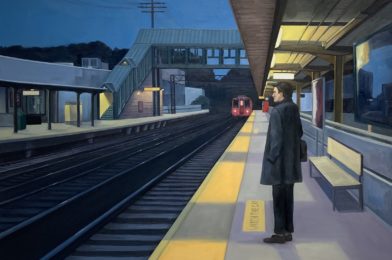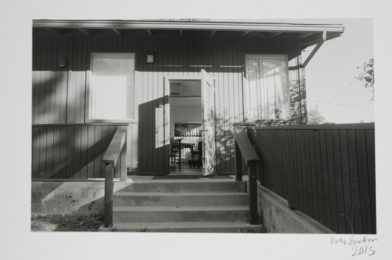graduation
It’s summer now so the call of the trains
bounding in the distance is closer
and the loudspeaker of the neighborhood pool
drifts through my window in between dusty sun.
She comes to me, railroad irises, 9:30 air,
cigarette clouds shirking their celestial duties.
Her fingertips are wise where I am not,
but here she is, flush with hairpins and lips tangled.
Flyswatter dreams and basement couches
mark the precipice of our staged world;
stage left: she cut her window screen and rained
stage right: the subway blues, always running,
always late. They say all the world’s a stage,
but all the world’s a macabre diorama of
my childhood fantasies, home address laced
in tongues and her, hitched in outer space:
fleeing lines and a cast party queen.
I turn the light on and the fan sings spoiled,
so I keep and devour in the dark.
There’s a two-year warranty on the corpse
that keeps screaming the family dynamic
hearse. Keep me in mind at the fork in the road,
toss a coin in my sullen ear, say something
to smother these early morning fears of perpetuity.
The tracks in the woods are silent, but
you can hear her departure in the birdsong:
the wicked echo in the bones of the station,
our lonesome whistles in harmony;
you can hear it like an audition tape acting
as stitches, like the shrieks of a fallen dancer,
like the syncopated footsteps of the mailman
in his last throes of communication,
his final steps leaking from his honeyed throat
in perfect cordial dial tones.
party portraits
the honeyed rising fills the shutters in between measures
reaching us in our huddled gasping bedroom
stately shouts creep from the basement roughly
every hour or so, dancing with the kitchen timer
the thermostat grows jealous and forms hardwood volcanoes
my tears simmer on igneous cheeks and run back groundward
we play three-story merry-go-round on the railings
all sorts of vocal leaping into non-stick pans
the martyr is praying in the bathroom
later she will shotgun a beer in canonized ecstasy
but for now she asks god to pierce the holy clock hands
and shorten the pendulum so her beloved swings back faster
the nighttime zephyr uncurls all the windows
and whistles from the very heart of the matter
the house never fully sleeps nor fully swings
the door handles and sock drawers rattle into jitterbugs
while the clown in the attic composes a symphony
all in minor, locked out of the dance hall
or having misplaced the entrance for a tin of lemon squares
and the bodyguard for the soft-spoken summer spiders
there are no eyes here which see the color of rage
but just because it hibernates doesn’t mean it sleeps
still, we make merry, and I officiate in full gusts
the light of the morning too much for the feeble instrument
I call them out one by one to be wed on the porch
and in the meantime, the pancakes burn
a spell of damning truth, what can be understood and not said
and the reverse, and drive, and park, and forbearing neutral
all leading towards the endless conversation home
to swim for land or call a taxi? finish the sentence or jump the fence?
I murmur damp soliloquies into the shoulder of your sweater
unraveling the harness that keeps your name etched in mountains
and forging bronze apologies for mere identity theft
the arterial jailers fell upon their knees for forgiveness
which comes only after bottling the rest for later and much coaxing
the silver-laned queen drives her fur coat home
and sleeps upside down, toppled by worldliness
she knew every language except opening and closing
it is her birthday, which comes every other century
and with much paunch and circumference
she stands atop the rails and sees a tongue slinking
thick with turpentine and a thousand never-closing eyes
it cuts corners and divests lonely maidens of their wits
fast and painless as a hailstorm, musical as the belly of a snake
I am ears to the ground as the grass sings envy
drinking songs to the birds passed out in the bath
where does intimacy live if not here?
some country greenhouse lane, strolling 12 bar blues
you: in women’s clothing, me: a coroner
the windows shut with molasses and still frostbitten
party portraits bathed in dawn, pennies for the erratic painter
sparrow song for the sunken half-full mugs
they towed her car on her 17th birthday and now she wanders
the backstreets looking for candles to blow out
my bedroom is a pale anemic impression of the real thing
I’m a parlor dweller I guess, refusing pearls left and right
in between changing the record I hear the neighbors whispering
but my friends are floating countertop, sweeping the races
and now the record is spinning conquered heartbreak
well—it’s unreleased, this conquering
but I can march and form garden gnome ranks any old day
today is the hole in time’s second-hand pockets
the secret to spinning and keeping balance
to sit round robin and not demur, to chew and mean it
even if it requires a little manual loosening
twenty-dollar bills and terra incognita time of morning
I want to see my love taken apart so I can build for once
see how he works, see what ticks in him and why
he cancels lunch and walks too quickly and shows early
and maybe with the operating table bare I’ll see
what went wrong, and why my heart no longer beats in his jaws
the discord like a dead bee in a soda can
after they leave I hear my mother’s breathing again
from the middle-class freeway down the hall
my brow has gathered icicles overnight
to be melted with the intensity of her moderation
knowing what the headstone says doesn’t help with the dying
but the ambiguity elbow greases my strung-out reflection
the clocks are out on strike but there’s a sneaking
into my rusted liver via the closet door
there’s a suspicious lack of blood on the floor
but punchy bluntness litter the depth of every angle
every unused rich kid soapbox obstructing the exit
the backstage pass like the upstairs at a party
party’s got to end, like the failings of the decade
the shot glass is still warring with the highball
and the roads all look the same down here
mid-morning hinges on goodwill regardless of intention
I’ll remember their sleeping faces in celluloid for as long
as eyes read between the grain and find breakfast
I can see summer from the window facing the street
and spring with it, on bicycle, going out for the day
at the latest possible sunset, she’ll go home to mother
with bruises peaching her howled mouth
and make up excuses for why the sky is so green this year
and why the flowers two-step to jazz drizzles
whittle my prospects in a cradle downstream
for someone’s more loving hands with longer fingers
better for reaching heart-itches in the subcutaneous
do the seven rivers of hell really slink upstream?
and do I? I want to be better at cooking breakfast for two
and seeing the sun for each ray, infinite in an inconvenient direction
so even when I’m scrubbing ceaselessly and skipping lunch
my house holds more river water than I have to give
and was built on top of words laced the old-fashioned way
with more whole hands than fingers can count
Caroline Coleman is a student and writer in the DC area, interested primarily in poetry, theatre, and film. She has also published work in Haloscope Magazine.
Visual Art by: Anastasiia Terekhina


